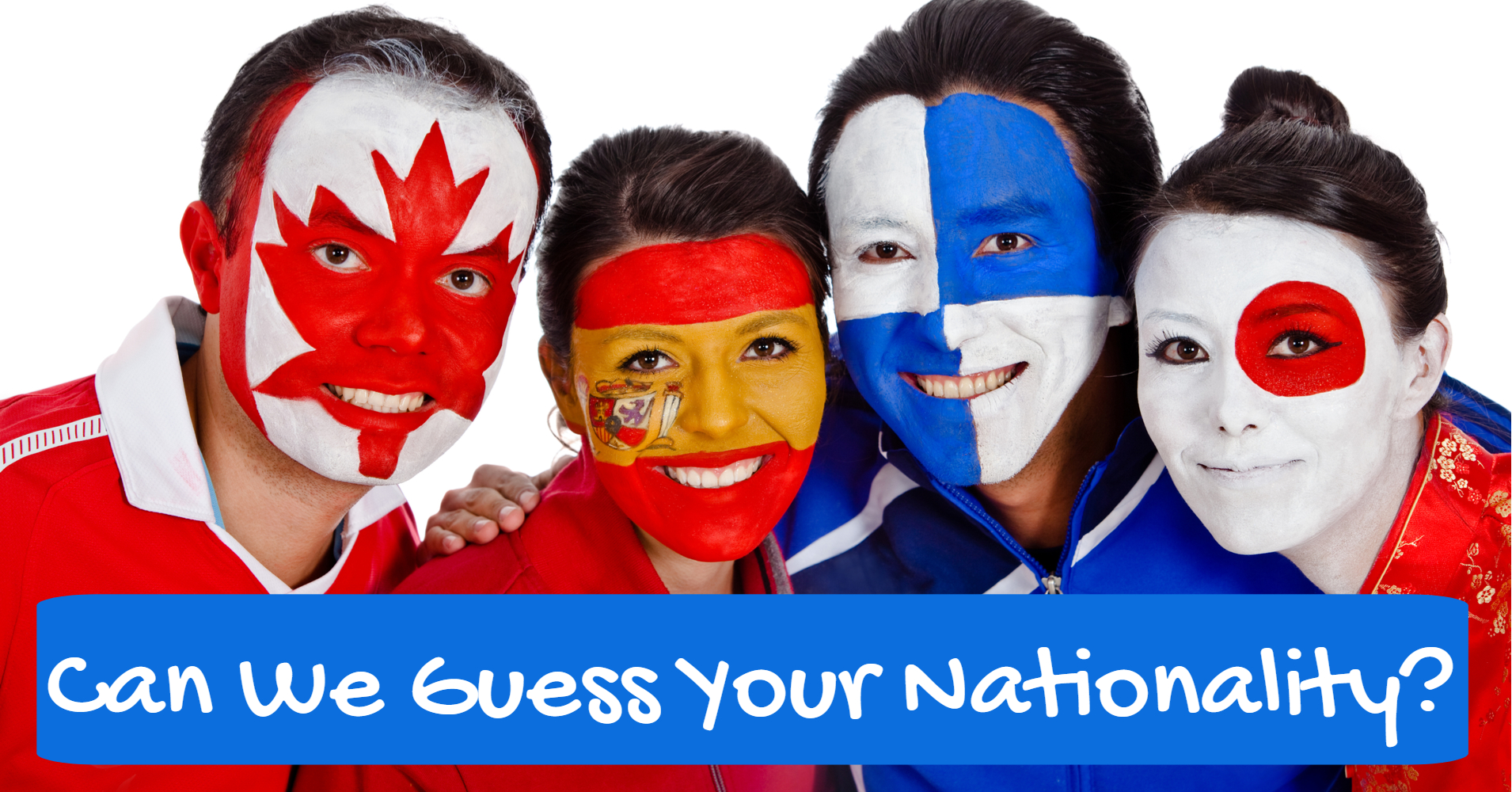Have you ever wondered if it's possible to guess the nationality by face? In an increasingly globalized world, understanding cultural differences and recognizing unique physical traits can be both intriguing and educational. The ability to identify someone's nationality based on their facial features has become a topic of interest for many, blending anthropology, psychology, and cultural studies. This article delves into the complexities of this concept and explores whether it's truly feasible or just a myth.
Facial recognition technology and human intuition often intersect when it comes to guessing someone's nationality. While some people believe it's possible to make accurate assumptions based on appearance, others argue that cultural diversity makes it increasingly challenging. This article will examine the science, history, and cultural implications of guessing nationality by face.
By exploring various aspects of this topic, we aim to provide a comprehensive understanding of the subject while addressing ethical considerations and promoting cultural awareness. Whether you're a curious traveler, a cultural enthusiast, or simply someone interested in human diversity, this article will offer valuable insights into the world of guessing nationality by face.
Read also:Vanessa Trump A Comprehensive Look At Her Life Career And Influence
Table of Contents
- Introduction to Guessing Nationality by Face
- Historical Perspective on Nationality and Appearance
- Scientific Research on Facial Recognition and Nationality
- Cultural Differences in Facial Features
- Limitations of Guessing Nationality by Face
- Ethical Considerations in Guessing Nationality
- Technological Advancements in Facial Recognition
- Practical Applications of Guessing Nationality
- Challenges in Identifying Nationality by Face
- Conclusion and Final Thoughts
Introduction to Guessing Nationality by Face
Guessing the nationality by face has been a topic of fascination for centuries. From ancient times to modern-day interactions, humans have attempted to identify cultural backgrounds based on physical appearance. While this practice has evolved over time, it remains a subject of debate among scientists, sociologists, and cultural experts.
In today's multicultural society, the ability to guess someone's nationality based on their face is both intriguing and controversial. On one hand, it reflects our natural curiosity about others and their origins. On the other hand, it raises questions about stereotypes and cultural sensitivity. This section explores the basics of this concept and sets the stage for a deeper dive into the topic.
Why Is Guessing Nationality by Face Important?
Understanding the reasons behind this practice helps shed light on its significance. Below are some key points:
- It promotes cultural awareness and appreciation for diversity.
- It highlights the complexities of human identity and belonging.
- It encourages discussions about the intersection of biology, culture, and geography.
Historical Perspective on Nationality and Appearance
Throughout history, people have used physical traits to identify individuals from different regions. From ancient civilizations to colonial explorers, the concept of guessing nationality by face has played a significant role in shaping cultural interactions. This section examines historical examples and their relevance to modern-day discussions.
Key Historical Events
Some notable moments in history include:
- The exploration of new continents and the documentation of indigenous populations.
- The development of early anthropological studies focusing on physical characteristics.
- The impact of globalization on perceptions of nationality and appearance.
Scientific Research on Facial Recognition and Nationality
Modern science has shed light on the possibility of guessing nationality by face. Studies in anthropology, genetics, and psychology provide valuable insights into the relationship between physical appearance and cultural identity. This section highlights key findings and their implications.
Read also:Who Is Joan Marjorie Drane Discover Her Inspiring Journey
What the Research Says
According to a study published in the Journal of Personality and Social Psychology, people are more likely to accurately guess someone's nationality when they have prior exposure to that culture. This suggests that familiarity and context play crucial roles in this process.
Cultural Differences in Facial Features
Facial features vary significantly across cultures due to genetic, environmental, and historical factors. This section explores these differences and explains how they influence our ability to guess nationality by face.
Common Traits Across Cultures
- East Asian populations often have distinct eye shapes and facial structures.
- African populations exhibit a wide range of skin tones and facial features.
- European populations show variations in hair color and eye color.
Limitations of Guessing Nationality by Face
While guessing nationality by face can be an interesting exercise, it is not without limitations. This section discusses the challenges and potential pitfalls of this practice.
Why It's Not Always Accurate
- Cultural mixing and migration blur traditional boundaries.
- Individual variations within cultures make it difficult to generalize.
- Stereotypes and biases can lead to incorrect assumptions.
Ethical Considerations in Guessing Nationality
Guessing someone's nationality based on their face raises important ethical questions. This section examines these concerns and offers guidance on how to approach the topic responsibly.
Respecting Cultural Sensitivity
It is essential to recognize that guessing nationality by face can sometimes lead to misunderstandings or offense. To avoid this, it is crucial to approach the topic with respect and an open mind.
Technological Advancements in Facial Recognition
Advances in technology have revolutionized the field of facial recognition. This section explores how artificial intelligence and machine learning are being used to improve the accuracy of guessing nationality by face.
How AI Works
Facial recognition algorithms analyze various data points, including:
- Facial structure
- Eye shape and color
- Skin tone and texture
Practical Applications of Guessing Nationality
While the concept of guessing nationality by face may seem abstract, it has several practical applications. This section highlights some real-world uses of this practice.
Examples of Use Cases
- Immigration and border control
- Cultural exchange programs
- Marketing and advertising strategies
Challenges in Identifying Nationality by Face
Despite its potential benefits, guessing nationality by face comes with its own set of challenges. This section addresses these obstacles and offers solutions for overcoming them.
Addressing the Challenges
- Improving cultural education and awareness.
- Encouraging open dialogue and mutual understanding.
- Using technology responsibly and ethically.
Conclusion and Final Thoughts
Guessing the nationality by face is a complex and multifaceted topic that intersects with science, culture, and ethics. While it is possible to make educated guesses based on physical appearance, it is important to approach this practice with sensitivity and respect for cultural diversity.
We encourage readers to explore this topic further and engage in meaningful discussions about human identity and belonging. Share your thoughts in the comments section below or explore other articles on our website for more insights into cultural diversity and global perspectives.
Sources:
- Journal of Personality and Social Psychology
- World Health Organization
- United Nations Educational, Scientific and Cultural Organization (UNESCO)

